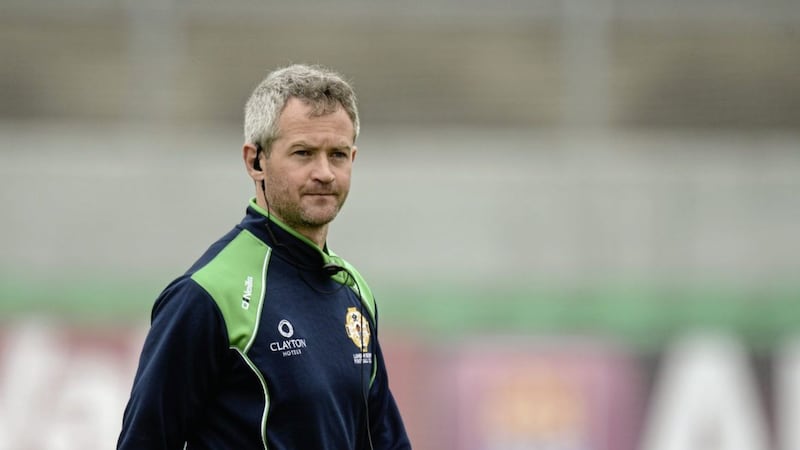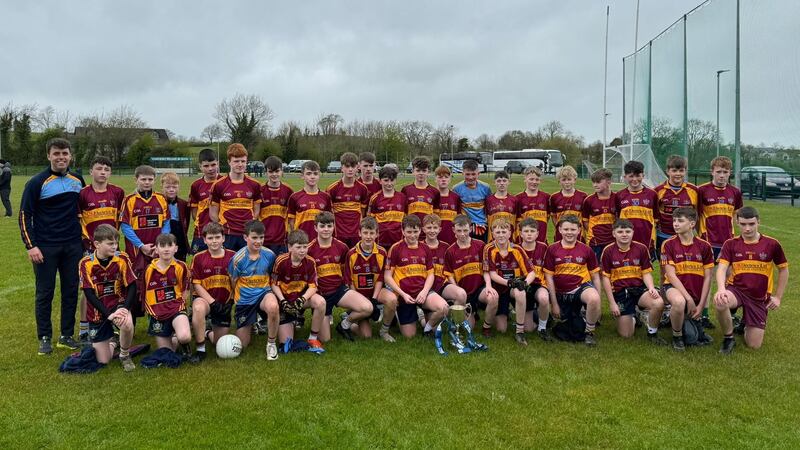LONDON’S North Circular Road wouldn’t be the home of too many GAA conversations, but Ciaran Deely’s car is like a cottage factory for them.
Days he gets sick of the traffic and takes the tube. It makes little difference barring the change of scenery. It’s at least an hour, sometimes two, from his home in Enfield in the north-west of the city to his work at QPR, where he operates as a part-time sports scientist in the English Football League club’s academy.
There he works to the head sports scientist, Ross Bennett. When Deely took over London in 2016, he managed to draw Bennett into a role as Head of Performance with London GAA.
A lot of his backroom team is filled out with men he’s met on the professional soccer circuit. Some of them with GAA connections and backgrounds, and some of them who had no prior notion of it at all.
In the morning, he monitors the fitness and wellbeing of the academy players. For instance, each morning they do a wellness questionnaire and counter-movement jumps to measure their neuromuscular fatigue.
It’s on the pitch in the afternoon, helping the coaches with whatever bits and pieces he’s handed. Warm-ups, fitness testing, nutrition, sports psychology and, the bit he likes the most, some coaching.
Almost every bit of it is transferable to the evening shift in Ruislip or Greenford or Ealing. Wherever’s available for London for their two weekly pitch sessions, which is complimented by a single gym session.
“With London, we’re trying to do everything on a very, very small budget. Instead of doing jumps every morning with an electronic mat, we’re doing the questionnaire.
“Up until recently we didn’t have GPS, so we’d be using RPEs, which asks the players how difficult they found the session on a scale of 1 to 10 in terms of intensity.
“Luckily StatSports have come in and helped us out, and we have 30 GPS units now. You’re taking a lot of the same sports science principles and putting them into a setup where you don’t have the technology or resources or funding.
“More importantly, you’re trying to take a lot of the stuff you see on the pitch, a lot of the coaching and the best practice coaching.
“I’ve brought a few members of staff from QPR into the London setup, and we’re well versed in looking at every player individually across the four-corner approach. It’s technical, tactical, physical, social.
“You’re trying to analyse every player and coming up with a player improvement plan, where you can sit down and look at what they need to improve on across each of the four corners, and what things they need to do before training, in training, away from training.”
They’re working off what is, in relative terms, a shoestring budget. London spend roughly £150,000 a year on their senior team, out of which they take four overnight trips across for National League games and weekend training camps in Dublin in January and May.
As much as Deely tries to bring every ounce of professionalism he can across, the stripped back feeling of the London setup gives him a certain sense that the mod-cons can sometimes be given too much prominence.
“I look at some of the Gaelic set-ups in Ireland and wonder is there a need for all those people? Is there a need for all the kit players get? Is there a need for all the wasted bottles of Lucozade Sport? I do wonder.
“People probably substitute excellence with lots and lots of these things thinking that it makes them excellent and really professional. I don’t know do we actually need that. But at times, obviously, it can help.
“There’s a basic standard of having good dinners after and all that, but on the other hand - and we try to get this ethos to our academy players at QPR – nothing substitutes for hard work, talent and good coaching.
“I see all the best S&C and sports science and whatever, but what wins games is those three things. Those are the most important things.
“The additional things like GPS analysis and supplements, they can be the little inches and the last few percent. But a lot of the time, the main chunk of performance is forgotten about in terms of good players and good coaching.”
He’s been in London for most of the last seven years, barring a six-month spell when he worked as Kerala Blasters’ strength and conditioning coach in the Indian Super League.
The former Wexford captain won a London SFC with Kerry Kingdom Gaels in the only year he played, but hung up the boots when former Exiles boss Paul Coggins took him on as his coach.
They stayed hung up until the autumn past, when the 36-year-old travelled home at weekends to help his native Horsewood win a Wexford intermediate championship from wing-forward.
It took a while for him to make a decision on a fourth year in charge of London. A big part of that was the inescapable feeling that it was “the end of a cycle”.
His squad this year has 20 new faces, a big tally even by London standards. He lost two of his top London-born stars, namely Adrian Moyles and Tom Waters. Had they been playing against Limerick last weekend, they would have brought to eight the number of homegrown starters.
Last year had seen them finish fourth in Division Four, finishing above Leitrim, Limerick, Waterford and Wicklow. All success is relative, and for London it represented a significant achievement.
But Deely admits the long-term future is concerning. The improving economy at home and the changing nature of emigrants that once came for the bricklaying and stayed for the football means they’ll struggle to maintain a strong hand.
“The big challenge is that there’s not a conveyor belt of London-born lads coming through. There’s a lot of work being done in the schools and at underage, but between the ages of 17 and 22, there’s a massive drop off.
“They’re going off to university to Newcastle or Cardiff or Loughborough or wherever, and that’s outside our control. “There are things in our control – the lack of games for those lads. There’s no county under-20 team. The clubs maybe don’t help themselves sometimes in that the Irish player who arrives off the flight is the new toy and he goes straight into the team, and the London boy has to play twice as well to get his place.
“There are a few challenges that really need to change. For long-term success, there needs to be a document drawn up as to how we develop young players. The team needs those young lads to have games.”
They have Galway in the first round of Connacht this year – “a ridiculous situation when you think about it,” he says – and Deely reckons this weekend’s trip to Derry is his best chance between now and May to find some sort of gauge of how well they’ll compete.
Last weekend in defeat by Limerick, he took great joy in having those six London-born players on the team. Centre-back Aidan McGarvey stepped straight out of Tír Chonaill Gaels’ junior team into inter-county football with just a few weeks’ training under him.
Their January training camp saw them face a Dublin development squad and their preparations got an unexpected boost when Ulster Club champions Gaoth Dobhair took in the sights of the capital and offered them a second challenge game.
“They beat us by a point. Against Limerick, we competed, we lost by a point and it could have gone either way. Turning those one-point defeats into one-point victories, that’s the last and hardest step.
“To me, this year if we competed in the division at all, that’d be a success.”







